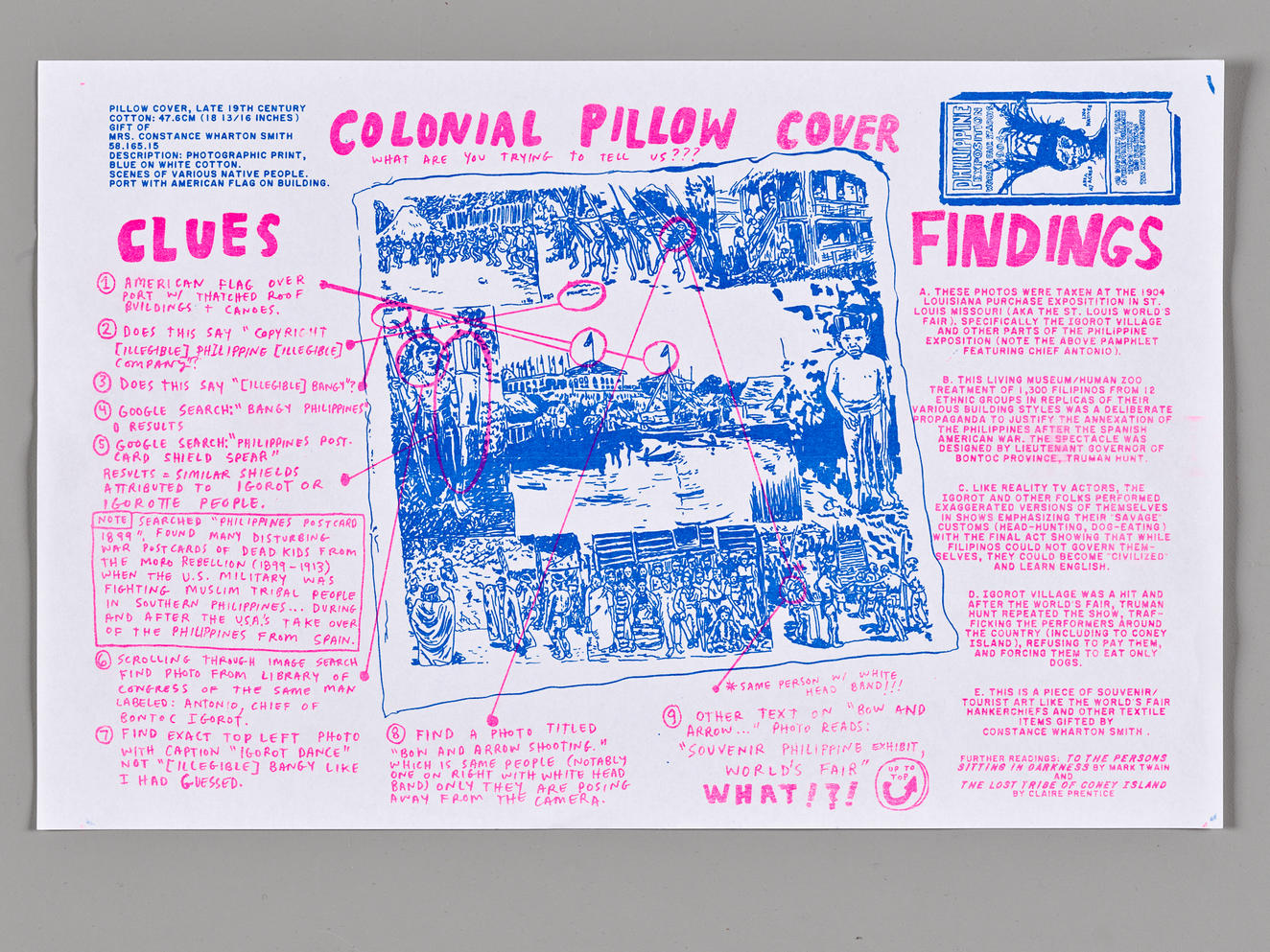on the Louisiana Purchase Exhibition Souvenir Textile
During his tenure as the RISD Museum's 2017 Artist Fellow, Walker Mettling became interested in a mysterious textile identified in museum records as a pillow cover. Through extensive research, Mettling unearthed the work's likely origin as a souvenir of the 1904 World's Fair and its complex history as a celebration of U.S. colonization of the Philippines and the exoticization of Bontoc Igorot people.
One particularly moving moment in the research process was the discovery of this speech delivered by Antero Cabrera’s granddaughter, Mia Antero Apolinar Abeya, to students at a middle school that sits where the St. Louis World’s Fair was once held.
Mia Antero Apolinar Abeya
Speech Delivered at
Wydown Middle School, 2000
Speech Delivered at
Wydown Middle School, 2000
Good morning. I am here this morning responding to the gongs that beat 96 years ago when the world was first introduced to us. Even though we cannot see them, I feel that our ancestors are here with us in spirit, silently beating their gongs once again. They came from the villages nestled on the mountaintops of Northern Philippines, where the comforts of modern life did not exist but where the beauty of mother earth abounds. For reasons that we may never know nor understand, they made a brave decision to leave their familiar surroundings and embark on a journey that led to a place they had never seen before. They came to America riding on a ship for the first time, barely knowing what to expect, where to live and who they would meet. History tells us that people paid to see them—these so called royalties of the wild. They became the curiosity of the western world and were called savages only because they were different. But being the resilient people that they are, these Igorots went back to their home in the mountains, perhaps sad and somewhat dejected but yet wiser and morally undefeated. They carefully kept their culture intact through the years, defiantly passing them on to the descendents you see today. They were people like my Grandfather Antero and Grandmother Takay who, unbeknownst to themselves, may have been destined to make the gongs resound in St. Louis so that the world might hear of Igorots.
My name is Maria Cristina Antero Apolinar Abeya or Mia for short. Allow me to tell you that I have a master’s degree in Business Administration; that I am currently employed by the Federal Government at the GS 15 level as one of its outstanding financial managers; and that I am a caring and loving wife, mother, and friend. I share these things, not to boast of my personal accomplishments, but to communicate to the world that contrary to what people thought of my grandparents at the 1904 fair, and perhaps even today to some degree, Igorots are and have always been people who are endowed with the ability to think, the capacity to learn, the aptitude to excel, and the graciousness to co-exist with other human beings. We just happen to be simple people who express ourselves differently, dance differently, and dress differently.
Call it my destiny, call it my fate, but I am deeply honored to stand here before you on the very grounds that my grandfather and grandmother stood upon some 96 years ago. We are here once more to make those gongs reverberate in their name, in the name of the Igorot, and in our children’s name. For is it not the children that brought us back to this honored place so that we may all be reminded yet one more time to treat all human beings equally regardless of how we look, what we eat, how we speak, and what we wear.
Yes, I hear the gongs of St. Louis calling once again after 96 long silent years—but this time, it is the sixth graders of Wydown Middle School beating the gongs. They are hunting for the heart of humanity. My dear school children, my heart dances to the beat of your gongs with great admiration for what you have started and with renewed hope in what we, as citizens of the world, can achieve together.
Walker Mettling was the 2017 RISD Museum Artist Fellow. This fellowship provides a stipend and the opportunity to investigate RISD Museum collections, with support and mentoring from museum staff, and to engage in research that benefits the fellow's personal practice and delves deeply into ideas, materials, and processes. Learn more
